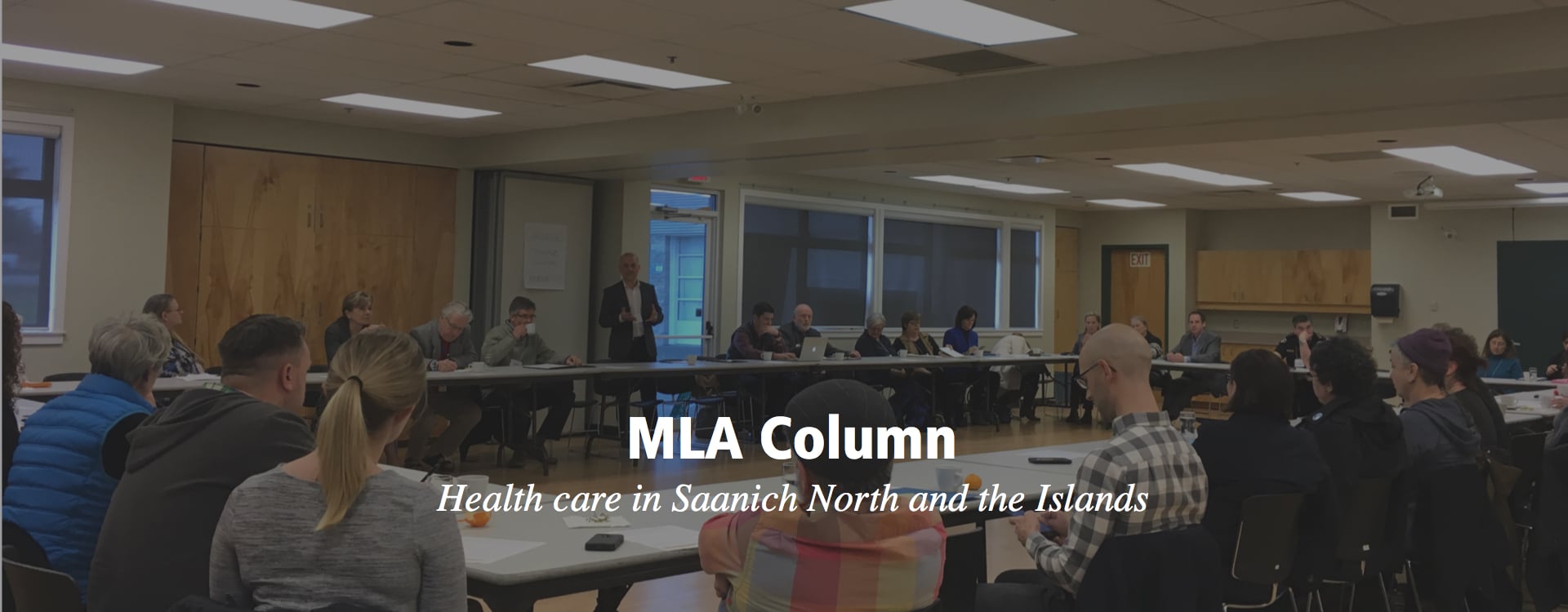Since my election last May, many of our meetings in the constituency office have been about health and well being. Several important issues have been raised from people and organizations delivering health services in our riding as well as from people who wanted to share their personal experiences with our health system.
We quickly realized we needed to have a bigger discussion and focus more of our attention on health care in Saanich North and the Islands.
I felt it was important to learn more about the system serving our riding and how we can improve it.
To that end, we have devoted a lot of time and energy in the first month of 2018 to health care.
We started by bringing over 80 health care service providers together on Salt Spring Island and in Sidney to hear the challenges and some of the opportunities we might consider.
My intent of these meetings was twofold: to become better informed and to build/strengthen community networks.
Despite the complexity of the system and the significant list of obstacles, it is exciting to be able to connect people and uncover the solutions that are right at our fingertips. We assume that health care providers all know each other, but that is not true.
So, getting people in the same room is a powerful place to start and I am thankful that so many health providers took time out of their schedule to participate.
As someone who does not come from the health care system, I have a lot to learn. The focus this month has helped me understand the system, the people, the challenges and opportunities and I am now confident that although there are key differences between the Saanich Peninsula and Southern Gulf Islands, the top challenges across the riding are largely the same: primary care (family doctors and community clinics), mental health, elder and youth care. Not surprisingly, housing was a huge concern in all parts of the riding. A person’s housing security goes a long way in determining their physical and mental well being.
Healthy homes, healthy people.
A key takeaway from the meetings was that there is enough money in our system already, it just needs to be spent more efficiently. Clearly, health professionals need to be part of fixing the problems.
Interestingly, nearly all of the discussion focused on helping illness. Clearly this is the focus of our current system. We need to do a much better job at focusing on wellness and prevention. Redesigning our system to ensure people are well, will free up resources to better help those who are ill.
To continue the health care discussion, we are inviting the public to participate in a community dialogue on health care on January 20 at our constituency office where they can share their experiences and ideas of how the system can be improved.
Last, on January 24, I am hosting Hon. Adrian Dix, Minister of Health, to a public Town Hall at the St. Paul’s United Church in Sidney. This is an excellent opportunity to hear from Minister Dix and ask him directly about health care in BC. Visit my website https://adamolsen.ca/ for more information. I hope to see you at one of our upcoming events.
Adam Olsen is the BC Green Party MLA for Saanich North and the Islands
Column originally published in the Peninsula News Review on January 19, 2018.
For more information about our health meetings check out this post.


Adam – I am totally impressed with the fact that you are holding public events, and that you are putting health care as a priority. I feel that we can’t get sidestepped into thinking that we have to create a duality in which illness is de-emphasized and wellness is accentuated. That is not exactly what is required in order to go from a fixation of illness toward a state of wellbeing.
Those who have experienced catastrophic illness need to be able to systematically deal with their experiences, and make their histories of worth, in sorting out policies and road blocks – so that people can in fact be a part of the process of envisioning and achieving well being.
Dr. Brian Goldman of CBC’s WHITE COAT BLACK ART has been moving toward a viewpoint that patients have to be included in the management of care. He has based this position on the fact that patients have an inherent advantage in knowing how services affect people, and patients have no vested interest in status-quo systems. Patients are free to explore, and to see how things are being done better elsewhere. With the evolution of internet communications, it will be possible for care and service teams to learn a great deal on how services may be improved in order to plan for the best solutions – instead of just ‘adapting’ to disabling conditions.
I would like to see some organizing in BC so that patients may be able to methodically engage in Goal 3 of the 17 Sustainable Development Goals for 2030. Tomorrow, I would like to see if that subject could be spearheaded as a topic that both you and MLA Furstenau might be able to help put into effect. I hope that there is a starting point commenced on this so that it might be raised with Minister Dix.
Thank you for your co-operation of this matter.
Alan Blanes
Ph 250-300-8400